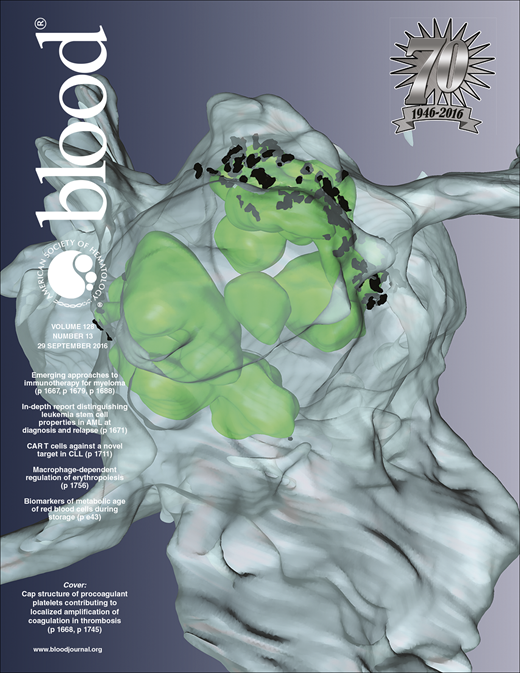In this issue of Blood, Ali et al provide the first clinical data that describe safety and efficacy of adoptive therapy with patient-derived chimeric antigen receptor (CAR) T cells targeting B-cell maturation antigen (BCMA) in multiple myeloma.1
The clinical development of cancer immunotherapy with CAR T cells is in a global race to obtain clinical proof of concept in entities other than B-cell leukemia and lymphoma. Multiple myeloma remains a largely incurable hematologic malignancy. Thus, the development of novel, targeted immunotherapies has been pursued aggressively. About 3 years ago, Carpenter et al reported their work on a novel CAR targeting BCMA in multiple myeloma and demonstrated efficacy against myeloma cell lines and primary myeloma cells in preclinical models.2 The group has now accomplished clinical translation and reports the first clinical trial with CAR T cells targeting a unique myeloma antigen.1 The study reported 4 dose levels from 0.3 × 106 to 9 × 106 CAR T cells/kg body weight, and clinical responses were seen at the 2 higher dose levels with 2 very good partial responses and 1 complete response lasting 17 weeks. Although this initial trial run was successful, highlighting the therapeutic potential of myeloma-reactive CAR T cells, it clearly leaves opportunity for improvement. The finish line of long-term disease control and cure is still distant in this CAR T-cell race against multiple myeloma.
BCMA has been implicated in myeloma pathogenesis. Recently, attention has shifted to BCMA as a target for immunotherapy because it is uniformly expressed on myeloma cells. BCMA has no known expression on normal solid tissue and only very restricted expression on normal hematopoietic cells, that is, on normal plasma cells, some memory B cells, and plasmacytoid dendritic cells.2-4 This favorable expression pattern has allowed the development of a remarkable armamentarium of BCMA-specific monoclonal antibodies (mAbs), bispecific antibodies, antibody-drug conjugates, and CAR T cells. Several additional clinical trials of CAR therapy are ongoing and employ alternative BCMA-CARs that incorporate humanized binding domains to reduce immunogenicity, alternative CAR spacer designs and costimulatory domains to enhance reactivity, and alternative gene transfer vectors. All of these variables have been shown to affect the potency and potentially safety of CAR T-cell products.5 The present clinical trial provides a first proof of concept and benchmark for subsequent trials.
The toxicity observed with BCMA-CARs in this trial included cytokine release syndrome with fever and hypotension as well as hematologic toxicity. The latter was quite significant in some patients, but within the range that can be explained by the lymphodepleting conditioning regimen and inflammation mediated by BCMA-CAR T cells in the bone marrow. B-cell depletion is not anticipated when targeting BCMA, as the majority of normal B cells are BCMA negative. The BCMA-CAR T-cell doses required for efficacy in this trial were somewhat higher than reported with CD19-CARs and responses were not as durable.6,7 The authors suggest that low-antigen density of BCMA on myeloma cells is a potential factor, and in some patients, antigen density was certainly lower compared with CD19 on lymphoma, but still far above the threshold presumed to be required for complete CAR activation. Another, potentially underestimated, variable is soluble BCMA protein that is present in serum of all myeloma patients and is used in this and previous studies as a biomarker for disease burden.2,8 The influence of soluble BCMA protein on CAR binding and CAR T-cell function has been studied in vitro with no negative impact.2 Still, it is logical to assume that soluble BCMA protein that contains the epitope recognized by the CAR and is present in molar excess in serum and bone marrow milieu has an impact. The persistence of BCMA-CAR T cells after administration to patients in this trial was relatively short (<3 months), reminiscent of what has been observed with similarly designed CD19-CARs and retroviral gene transfer by the same group.6 The persistence and depth of engraftment may be augmented with optimizing CAR design, attention to the proportions of CD8+ killer and CD4+ helper T cells in the infused product, and optimizing the lymphodepleting conditioning regimen.5,7 The immunogenicity of the BCMA-CAR that contains a murine-binding domain has unfortunately not been investigated.
The “gold medal” outcome for hematologists caring for myeloma patients is to achieve long-term disease control and eventually cure. Many novel substances are currently being employed in treatment algorithms, including new proteasome inhibitors, histone deacetylase inhibitors, immune modulatory drugs, and mAbs. The conceptual advantage of CAR T cells is that they provide a new and currently uncovered spectrum of effector mechanisms against myeloma that can be complemented in combination therapies. There is a fully loaded pipeline of novel CARs targeting alternative myeloma antigens, including CD38 and CD44v6,9,10 to name just a few, as well as SLAMF7-CARs that are being developed at our own institution. An important side note is that the clinical efficacy of BCMA-CAR therapy correlated with and was predicted by preclinical studies in murine xenograft models that will also aid in shaping the next wave of CAR T-cell therapy in myeloma.
CAR T cells have made their debut in multiple myeloma! It is an encouraging start. Keep on rolling, myeloma CARs!
Conflict-of-interest disclosure: The authors declare no competing financial interests.

